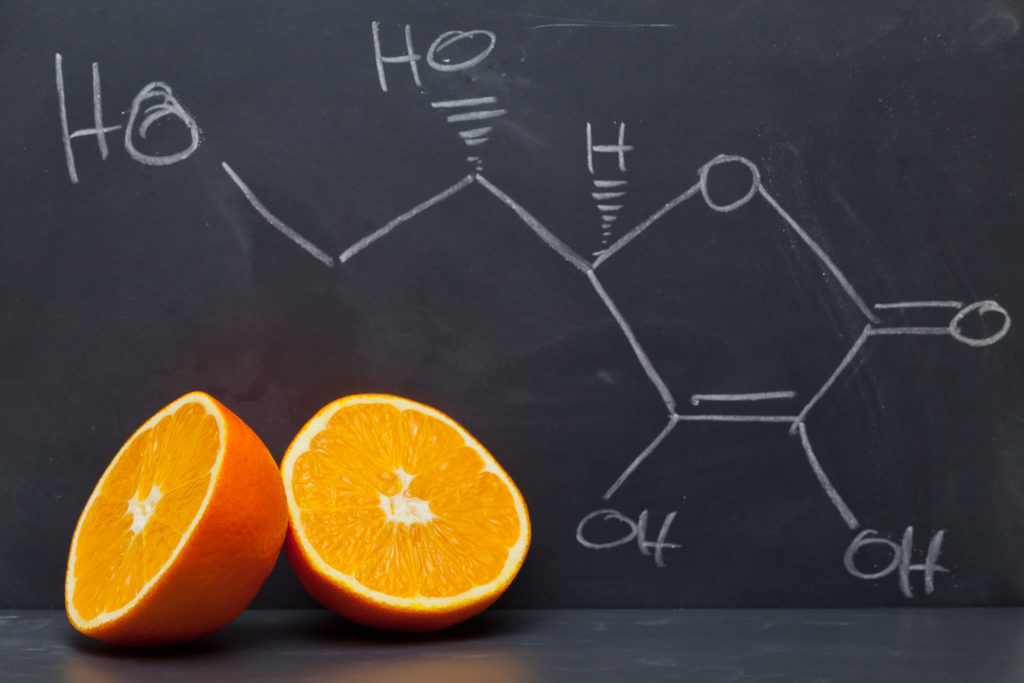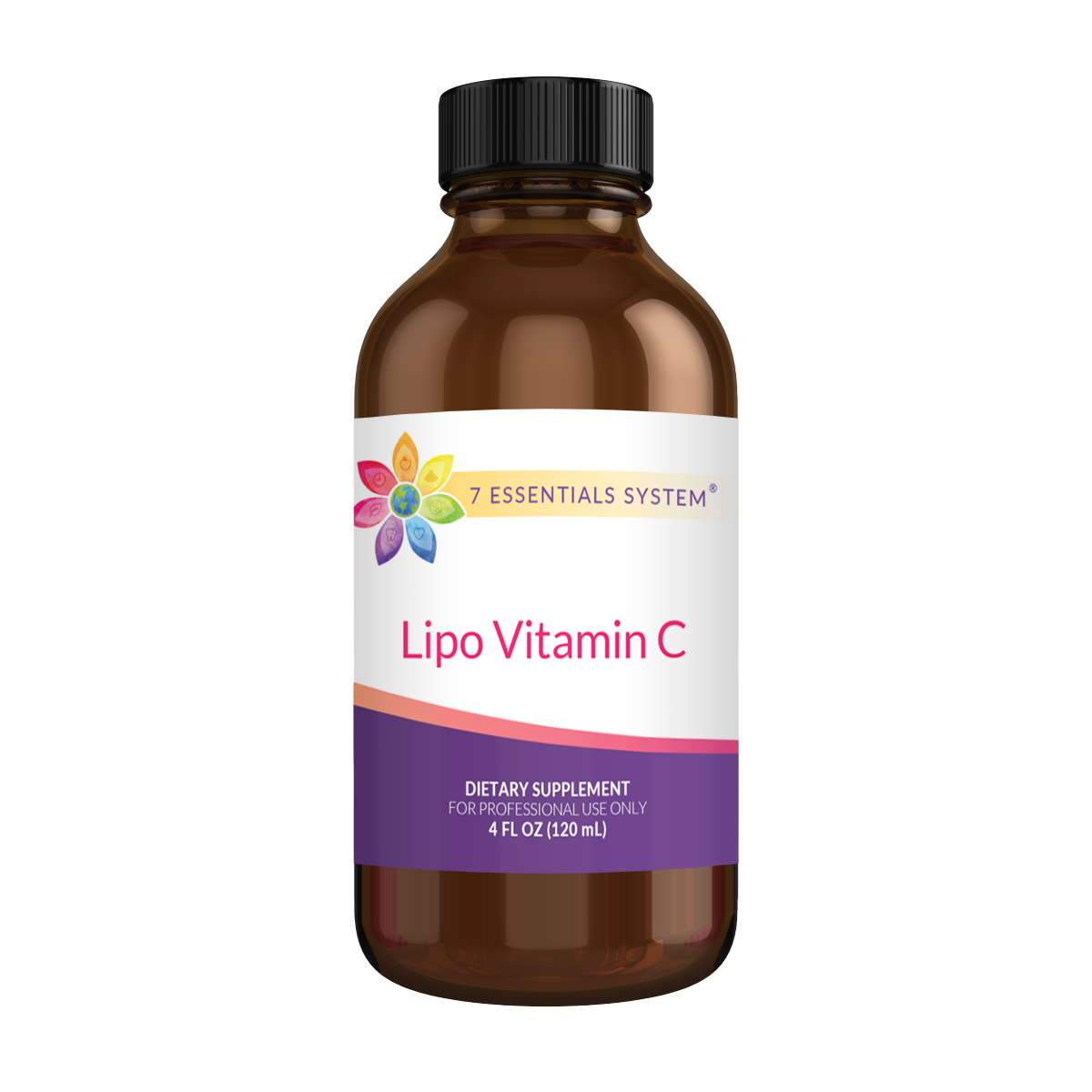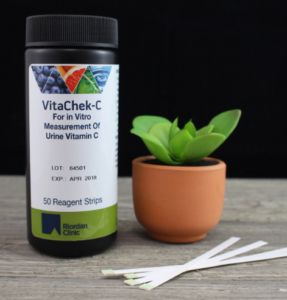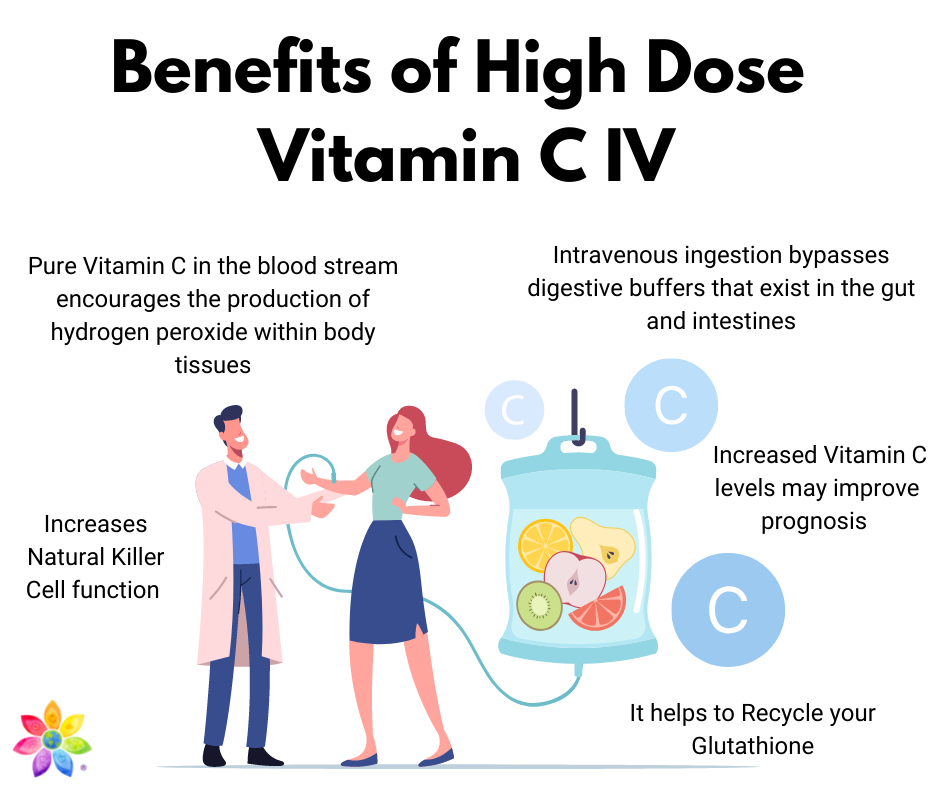
We all know that vitamin C is good for us. We may even be aware of all the great ways it is beneficial. What we may not know is the best way to get that most essential vitamin into our system to help prevent cancer and even inhibit tumor growth. Read on to learn about two ways to “get in your C” — vitamin C IV and liposomal vitamin C — that have proven to be the most effective for getting in the nutrients you need as well as directly helping with disease, including Breast Cancer.
The Power of C
First, let’s do a quick review of all the things vitamin C does in the body. It is one of the most important vitamins for the healthy performance of many mechanisms. It is needed every day for:
- the formation of collagen and blood vessels, cartilage, muscle, and bone,
- helping in protein metabolism,
- helping to protect cells,
- boosting the immune system,
- protecting against DNA damage,
- working as one of the most important antioxidants in your body and as an essential nutrient for lowering oxidative stress,
- helping with the absorption of certain kinds of iron as well as the regeneration of other key antioxidants, including vitamin E
…and much more!
Linus Pauling was a two-time Nobel Prize winner, author, and researcher in chemistry and molecular biology. Pauling spent his life researching the health benefits of vitamin C.
“I believe that by improvement in nutrition, especially increased intake of vitamin C, and by other health practices it will be possible for people to remain in good health for 25 years longer than at present time,” said Pauling in one of his writings entitled Orthomolecular Enhancement of Human Development.
Even the National Institutes of Health acknowledges the connection between vitamin C and the prevention of many diseases, including cancer.
The Challenge is Absorbability
There is no doubt that vitamin C is a “super nutrient” for health on all levels, especially when it comes to cancer. The challenge, however, is getting enough of it in your system for it to do its job. Unlike many other nutrients, the body does not produce vitamin C. It must be obtained from external sources. For most of human history, this came in the form of whole foods. Citrus fruits, peppers, cabbage, spinach, berries, and tomatoes are just a handful of the foods that contain high amounts of vitamin C. In modern times, many people also take vitamin C orally in supplement form. The most common way is through capsules, chewables, and powders that contain L asorbic acid.
The key question that many people have about vitamin C is: “Will getting vitamin C in these forms be enough to keep me healthy?” The answer in most cases is no.
Another challenge lies in absorbability of vitamin C once you ingest it. Even if you are very healthy, when you take 1,000 mg of vitamin C in supplement form or through eating a grapefruit, for example, your body will not use 100% of the C. This is because, when you ingest vitamin C, it has to travel through the digestive system and the bloodstream. Along the way, significant amounts are lost.
AS a case in point, vitamin C has to go through your small intestine to get to your bloodstream. This is where the majority of absorption actually occurs. The same microscopic transportation mechanisms that shuttle vitamin C through the intestinal wall into the bloodstream also transport other substances, like glucose. In effect, vitamin C has to “share a ride” with other substances and can can only “hop on board” in limited amounts.
What’s more, those who smoke (or are exposed to second hand smoke), have issues with digestion (IBS, Leaky Gut, ect), who eat the “Standard American Diet” (SAD), who suffer from chronic stress, or are dealing with another health condition may have vitamin C absorbability rates that are significantly lower than normal. A conservative estimate of normal vitamin C absorbability is roughly 70-90 percent of ingested amounts.
Vitamin C IV and Cancer
All that being said, when the right kind of vitamin C is absorbed into the body in the right amounts, research indicates that some pretty amazing mechanisms begin to happen, including the direct inhibiting and destroying of cancer cells.
According to research, as an antioxidant, vitamin C has the ability to target and inhibit cancer cells in a number of ways. In general, vitamin C is a “quick-change artist.” When it comes across a cancer cell, it will convert into DHA (dehydroascorbic acid), which allows it to enter into the cancer cell safely. Once inside, it converts itself back into its natural form (ascorbic acid), where it is able to destroy the cancer cell through oxidation. What a clever nutrient!
There is no doubt that vitamin C is a cancer killer. The challenge is getting enough of it in the body for it to have this effect on already-progression cancer cells.
There is strong evidence that shows that getting in healthy amounts of dietary vitamin C (not supplementation) can help prevent Breast Cancer. According to the Linus Pauling Institute, this is about 400 mg/day. Getting enough to affect already-active cancer cells is another story. According to research done at the Weill Cornell Medicine in New York City, “it takes the equivalent of about 300 oranges to trigger Vitamin C’s Trojan-horse response that can kill cancer.” That is a lot of OJ!
Enter vitamin C IV. Placing certain formulations of vitamin C directly into the bloodstream bypasses the digestive process altogether. This allows the body to absorb larger quantities of C and reach saturation. Vitamin C IV has been shown to:
-Stimulate hydrogen peroxide production in the tissues, which can flush out cancer cells with the help of white blood cells,
-help recycle glutathione, often called the “mother antioxidant,”
-stimulate Natural Killer Cell activity,
…and much more!
Liposomal Vitamin C
Another very powerful method of increasing vitamin C absorbability overall is by ingesting liposomal vitamin C. “Liposomes” are actually tiny fat “droplets” which are able to pass through digestive substances and mechanisms. When ascorbic acid is surrounded by liposomes, it is able to slip into your bloodstream untouched. The result is higher vitamin C absorbency overall.
So what does the science say about the effectiveness of liposomal vitamin C for cancer? The research continues in this subject and to date there have been no studies that have directly looked at specific liposomal vitamin C protocols to address cancer.
It is estimated that 1000 mg of Liposomal Vitamin C ( 1 teaspoon) is equivalent to 6000mg of ascorbic acid.
The general consensus, however, is that liposomal vitamin C far surpasses regular supplementation in terms of absorbency. Thus, it is the ideal method of vitamin C delivery for general health maintenance on a daily basis.
Be sure to check out the graphic in this article for a DIY liposomal vitamin C recipe created by one of our own Breast Cancer Conqueror coaches, De’Ann.
“I am always interested in at-home things we can do to support and boost our health, so homemade Liposomal C was an immediate interest to me,” says De’Ann. “Being healthy and happy does not have to be hard. As a matter of fact, it can sometimes be homemade and fun like this recipe!”

If you want to save yourself the work and still reap the benefits of liposomal vitamin C for Breast Cancer prevention and general health, be sure to check out this recommended product in the Breast Cancer Conqueror store.
How to Test for Vitamin C Saturation – Are you getting enough?
When it comes to using ascorbic acid to directly affect Breast Cancer tumors, however, it appears that vitamin C IV is still the best way to go according to recent research. But how do you know how much is right for you when doing vitamin C IV?
Some studies have shown that vitamin C IV can result in up to a 70-fold higher plasma vitamin C concentration in the body when compared to regular supplement administration. In addition, according to the Linus Pauling Institute, there have been a few small clinical trials which have found that, in pre-screened individuals with advanced cancer, “intravenous administration of vitamin C at doses up to 1.5 g/kg of body weight (equivalent to about 100 g/day for an average weight [70 kg] person) and 70 to 80 g/m2” were shown to be safe. Observational studies have also found that typical vitamin C IV dosages were helpful for easing fatigue and improving the quality of life of cancer patients going through traditional chemotherapy.
But what if you want to know for sure if vitamin C IV is working for you? That is when you may want to consider getting a Vitamin C Saturation test.
The Riordan Clinic has been applying Vitamin C IV to their patients and have been researching it for decades. The recommended protocol to know if you are getting enough Vitamin C for your individual needs is this:
- After your IV, have your blood drawn in the opposite arm from the IV.
2. Send the sample to any typical lab and test for Vitamin C Levels.
3. The ideal range, called the “Tumor Lysing Range” (tumor breakdown range) or therapeutic range is 350 – 400 ng/mL.
For example: If you received 50 grams of Vitamin C IV and your lab results fall below that range, it may be helpful for you to increase the dosage of your IV’s until you reach that range.
During my second healing journey, I had to go as high as 100 grams of Vitamin C to reach that range. But after a few weeks, I was able to start lowering the dosage.
 Again, because IV bypassed the normal absorbency barriers put in place by the digestive system, you will not experience the normal signs that you have “had too much.” Typically, with oral vitamin C, this is indicated by loose bowel movements.
Again, because IV bypassed the normal absorbency barriers put in place by the digestive system, you will not experience the normal signs that you have “had too much.” Typically, with oral vitamin C, this is indicated by loose bowel movements.
The Riordan clinic also sells Vitacheck C Strips. The test strips are designed to be a fast and simple way to check your nutrient levels of Vitamin C daily so that you can adjust your diet or nutrient regimen accordingly
I also recommend that, prior to getting your vitamin C IV, you get tested to see if you may have any sensitivities to vitamin C IV and vitamin C in general. One, in particular, is the G6PD (glucose-6-phosphate dehydrogenase) deficiency test. G6PD deficiency is connected to heightened sensitivity to vitamin C. Always consult with your health care provider before beginning any type of IV treatments.
The Evidence is In: Cancer Preventer (and a Cancer Buster Too)
Liposomal vitamin C can and should be a major tool in your toolbox for creating vibrant health. In the form of vitamin C IV, it can also be a major natural health modality to consider if you are on a healing journey with Breast Cancer as well.
According to research, low levels of vitamin C in blood plasma are consistently found in stage 3 and 4 Breast Cancer patients. I have seen this connection in my own coaching with hundreds of individuals with Breast Cancer as well.
This means that consistently not getting enough vitamin C every day can raise your risk of both Breast Cancer and cancer metastasis. Raise your C levels, and you raise your health!
Liposomal Vitamin C product is my top recommendation!
The Karlfeldt Center in Idaho
The Karlfeldt Center In Boise, Idaho, is leading the movement in breakthrough integrative oncology treatments, including different types of Vitamin C IV Therapy. It has become my personal go-to center and the one I send all my wellness warriors to. Check out their other Integrative Oncology Therapies and programs, and consider them a power tool in your healing toolbox. It’s 10 minutes from the Boise airport, and they help book your hotel and anything else you need…plus Boise is a fun city to visit!


I am not a cancer patient, but our daughter died of TNBC. I am taking Pecta-sol C. Is that effective?
Hi Ginger! This will provide some information for you… https://breastcancerconqueror.com/benefits-modified-citrus-pectin/
I would love to know options available to those of us with G6PD. I am reluctant to try higher dosing vitamin C, but cannot find credible resources on how best to support my vitamin C levels.
Hi Marcia! I actually just checked with Riordan Clinic in Kansas (THE go to for IV Vitamin C info). They told me that they would never go over 7.5 GM in an IV for someone with a deficient G6PD. She said that they will use holistic measures to improve health including adding lipospheric vitamin C to the oral regimen for a few months and then test the G6PD to see if it has improved.
Thank you so much for this answer! Does merely having the G6PD gene mean one is deficient G6PD? I began high dosing vitamin C to support my immunity, taking 8-10 grams of ascorbic acid in divided daily doses. Then several months later realized I was very anemic. Unfortunately my doctor is not versed in G6PD and does not see a correlation. Yet I wonder if a person with the G6PD gene taking large amounts of ascorbic acid would cause some type of hemolytic event that results in anemia. I’d love any thoughts or resources you wish to share!
Does merely having the G6PD gene mean one is deficient G6PD?